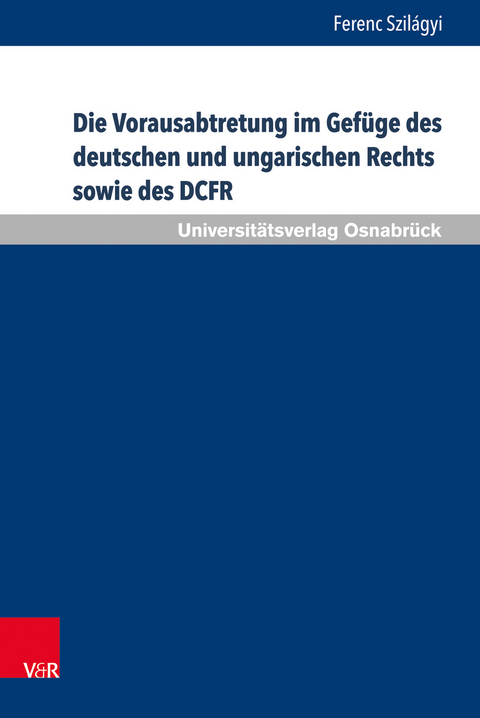
Die Vorausabtretung im Gefüge des deutschen und ungarischen Rechts sowie des DCFR
Seiten
2017
V&R unipress (Verlag)
978-3-8471-0718-7 (ISBN)
V&R unipress (Verlag)
978-3-8471-0718-7 (ISBN)
Deutsches und ungarisches Recht im Vergleich mit dem DCFR
Bei der Vorausabtretung, die zahlreichen Transaktionstypen des modernen Wirtschaftsverkehrs zugrunde liegt, tritt der Zedent eine Forderung ab, die es als solches noch nicht gibt. Dies führt zu Schwierigkeiten beim Erwerbsvorgang. Diese Arbeit erfasst rechtsvergleichend die Vorausabtretung im Gefüge des deutschen und ungarischen Rechts sowie des europäischen Modellregelwerks DCFR. Nach einer rechtshistorischen Darstellung geht die Arbeit auf den Forderungsbegriff und Grundfragen des Zessionsrechts ein, um sich dann dem Begriff der künftigen Forderung, der rechtsdogmatischen Konstruktion der Vorausabtretung, ihren Erscheinungsformen bzw. ihren Funktionsäquivalenten zu widmen. Außerdem geht es darum, wie sich die Eröffnung des Insolvenzverfahrens und das Betreiben der Einzelzwangsvollstreckung auf die Vorausabtretung auswirken. The assignment of future receivables (claims) operates as a ‘legal vehicle’ in a number of transactions within the modern economy. The assignment of future claims refers to the process by which the assignor assigns a receivable which, as such, does not exist at the time that the assignment is made. The fact that the receivable does not exist leads to difficulties in the process of transfer. This thesis deals with the assignment of future receivables under German and Hungarian law as well as under the Draft Common Frame of Reference (DCFR) from a comparative law perspective. From the outset, this thesis addresses the historical background of the assignment, the concept of a receivable (claim) and conceptual issues of assignment. Following this, the thesis turns to the assignment of future receivables and addresses the concept of future receivables, the doctrinal structure of the transfer of future receivables and the types of transaction implying the assignment of future receivables. In addition, the respectively functional equivalents of these types of transaction under Hungarian law and the DCFR will be discussed. Finally, the thesis addresses the impact of opening insolvency or individual compulsory enforcement proceedings and how this will affect transfer when a future receivable is assigned.
Bei der Vorausabtretung, die zahlreichen Transaktionstypen des modernen Wirtschaftsverkehrs zugrunde liegt, tritt der Zedent eine Forderung ab, die es als solches noch nicht gibt. Dies führt zu Schwierigkeiten beim Erwerbsvorgang. Diese Arbeit erfasst rechtsvergleichend die Vorausabtretung im Gefüge des deutschen und ungarischen Rechts sowie des europäischen Modellregelwerks DCFR. Nach einer rechtshistorischen Darstellung geht die Arbeit auf den Forderungsbegriff und Grundfragen des Zessionsrechts ein, um sich dann dem Begriff der künftigen Forderung, der rechtsdogmatischen Konstruktion der Vorausabtretung, ihren Erscheinungsformen bzw. ihren Funktionsäquivalenten zu widmen. Außerdem geht es darum, wie sich die Eröffnung des Insolvenzverfahrens und das Betreiben der Einzelzwangsvollstreckung auf die Vorausabtretung auswirken. The assignment of future receivables (claims) operates as a ‘legal vehicle’ in a number of transactions within the modern economy. The assignment of future claims refers to the process by which the assignor assigns a receivable which, as such, does not exist at the time that the assignment is made. The fact that the receivable does not exist leads to difficulties in the process of transfer. This thesis deals with the assignment of future receivables under German and Hungarian law as well as under the Draft Common Frame of Reference (DCFR) from a comparative law perspective. From the outset, this thesis addresses the historical background of the assignment, the concept of a receivable (claim) and conceptual issues of assignment. Following this, the thesis turns to the assignment of future receivables and addresses the concept of future receivables, the doctrinal structure of the transfer of future receivables and the types of transaction implying the assignment of future receivables. In addition, the respectively functional equivalents of these types of transaction under Hungarian law and the DCFR will be discussed. Finally, the thesis addresses the impact of opening insolvency or individual compulsory enforcement proceedings and how this will affect transfer when a future receivable is assigned.
Dr. Ferenc Szilágyi ist Referent für ungarisches Recht in einem Forschungsprojekt zum Sachenrecht in Europa (Osnabrück). Seit 2011 arbeitet er als Universitätsassistent am Lehrstuhl für Privatrecht und Handelsrecht der Juristischen Fakultät der Katholischen-Pázmány-Péter-Universität in Budapest.
| Erscheinungsdatum | 02.03.2017 |
|---|---|
| Reihe/Serie | Schriften zum Internationalen Privatrecht und zur Rechtsvergleichung ; Band 040 |
| Verlagsort | Göttingen |
| Sprache | deutsch |
| Maße | 160 x 237 mm |
| Gewicht | 740 g |
| Themenwelt | Recht / Steuern ► EU / Internationales Recht |
| Recht / Steuern ► Privatrecht / Bürgerliches Recht ► Internationales Privatrecht | |
| Schlagworte | Abtretung • Aufrechnung • Deutschland • Draft Common Frame of Reference • Factoring • Forderung • Forderungsverpfändung • Registerpfandrecht • Sicherungszession • Ungarisches Recht • Ungarn • Vorausabtretung • Vorauszession • Zession |
| ISBN-10 | 3-8471-0718-6 / 3847107186 |
| ISBN-13 | 978-3-8471-0718-7 / 9783847107187 |
| Zustand | Neuware |
| Haben Sie eine Frage zum Produkt? |
Mehr entdecken
aus dem Bereich
aus dem Bereich
1. Halbband: §§ 433-480, CISG
Buch | Hardcover (2024)
C.H.Beck (Verlag)
CHF 166,60


